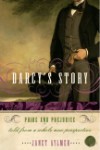| Another
Review at MyShelf.Com | ||||||||||||||
|
by Janet Aylmer When Fitzwilliam Darcy meets Miss Elizabeth Bennet, a gentleman’s daughter, he is immediately taken with her liveliness of mind and spirit, uncommon attributes for young ladies in early 19th century English society. Very much a man of his time, Darcy is aware of his own significance and knows Elizabeth’s lack of wealth and connections make her unworthy of his attention. Unfortunately for Darcy, Elizabeth is the one woman he can’t forget. Darcy’s Story is of his internal struggle to accept Elizabeth as she is and acknowledge the truth about himself. Darcy’s Story finally gives us a glimpse of what Darcy is thinking and his motivations as he seeks to put distance between himself and Elizabeth. He encourages Bingley to leave his newly-leased Netherfield estate and his cousin, Fitzwilliam, to make an extended visit to a not-so-beloved aunt in Kent. While visiting her friend in Kent, Elizabeth and Darcy make their feelings for each other known. Enough truth is spoken that Darcy can think of nothing but returning to his home and nursing his wounded pride. The opening leaves no doubt that this is a spin-off of Pride and Prejudice - and is Darcy’s story. Rather than beginning with his friend Bingley’s move to Netherfield, Darcy’s Story begins with what has a true impact on Fitzwilliam Darcy’s life at the present time, and in the future - rescuing his sister, Georgianna, from George Wickham’s attentions. It’s difficult to place this book as a stand-alone story, as it really is looking through a mirror at Jane Austen’s Pride and Prejudice. While the large chunks of Pride and Prejudice repeatedly quoted are a disappointment, and the book lacks the wit and humor evident in Miss Austen’s writings, Janet Aylmer stays true to Miss Austen’s characters and the mores of the time. Even if it is annoying to have so much of Pride and Prejudice quoted, the truth is, you can’t imagine Darcy saying anything but "My good opinion once lost is lost forever," to Elizabeth when discussing faults. Now, in Darcy’s Story, we learn what Darcy was really thinking when he made the comment. The first few chapters of the book were rather slow going, the writing stilted. Regardless, the story itself was interesting, and I believe Jane Austen would have heartily approved of this Darcy’s perspective. |
|
|||||||||||||
©
2006 MyShelf.com |
||||||||||||||
 Darcy’s Story
Darcy’s Story